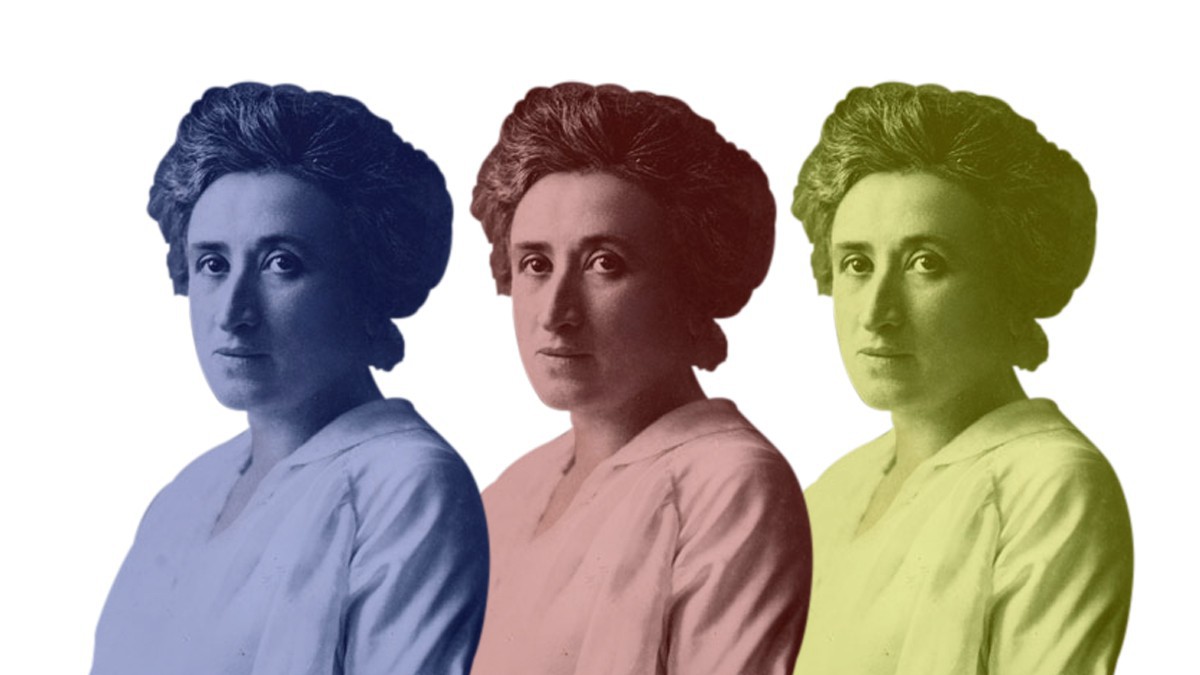One hundred years after the murder of Polish-German revolutionary socialist Rosa Luxemburg, are any of her ideas relevant for people today who want to transform society to achieve social and ecological justice? I believe the answer is yes. In spite of the many differences between our times and hers, some of Luxemburg’s most important ideas are still valuable political resources today.
I contend that Luxemburg’s ideas are a more valuable starting point for today’s left than the ideas of any of the other major anti-capitalist thinkers of the twentieth century. Why? First, she was profoundly committed to human liberation, unlike much more influential figures like Joseph Stalin and Mao Zedong who established a new form of class rule over workers and peasants. Her commitment to liberation was also more consistent than that of her famous contemporaries Vladimir Lenin and Leon Trotsky. Second, the context that shaped her politics was less different from ours today than the Russian Empire that shaped Lenin and Trotsky’s politics or even Antonio Gramsci’s Italy.
Still, it’s a mistake to try to simply apply Luxemburg’s politics today or look for answers to all of our questions in her writing. For one thing, capitalist society today is different from capitalism a century ago in ways that really matter – from social media to the end of direct European colonial rule and the classical workers’ movement. For another, Luxemburg wrote before some important questions of our time had even been posed – for example, how best to fight for drastic measures to reduce climate change? How to end the settler-colonial oppression of Indigenous people? Can workers change highly bureaucratic unions? It’s also true that she didn’t address some of the questions of her time in a fully adequate way, and some of her answers to those questions were wrong.
That said, my aim here is to discuss some of what we do find in Luxemburg’s thought that is relevant and important today, not what we don’t find. Five ideas stand out as especially important.
1. Capitalism inevitably causes terrible destruction and will eventually lead to total social breakdown (what Luxemburg called “barbarism”), with the loss of the best achievements that humanity has created under capitalism, unless people rise up and start a transition to a different society. Long before total social breakdown, capitalism throws up all sorts of regression and destruction.
Luxemburg grasped that a system in which goods and services are produced for profit by competing firms, one in which the small number of countries where that system is most developed dominate the rest of the world – imperialism – is inherently destructive and leads to devastating wars.
As she wrote, “The triumph of imperialism leads to the destruction of culture, sporadically during a modern war, and forever, if the period of world wars that has just begun [she is referring to the First World War] is allowed to take its damnable course to the last ultimate consequence […] the destruction of all culture […] depopulation, desolation, degeneration, a vast cemetery.” This was an accurate prediction of the world wars and the Holocaust that happened between 1914 and 1945. Her view has also been confirmed by the wars in Vietnam from the early 1960s to 1975, in Afghanistan and Iraq from 1979 into the early 21st century, in Congo from 1998 to 2003, and others.
There were weaknesses in Luxemburg’s theory of capitalism. But she was right to understand it as a chaotic system inherently driven by competition between firms and states into social crises, a system that will eventually inflict widespread extermination on humanity if it is not replaced.
Today capitalism is tearing open rifts in the relationship between humanity and the rest of nature, threatening to disrupt the boundaries within which our species have existed for millennia (some scientists who see this boundary-crossing as defining a new era in Earth’s history have dubbed this period the Anthropocene). Climate change is extremely dangerous, but it’s only one aspect of what’s happening. There is also the extinction of species, the acidification of oceans, the depletion of fresh water, reduced genetic diversity of crops, and more. This ecological crisis is guaranteed to give us a future of worse suffering, strife, and social crises in a world in which many states have chemical and biological weapons, and some have nuclear weapons.
Luxemburg’s understanding helps us to see why there can be no capitalist solutions to the ecological crisis, as so-called ecomodernists believe. It also guards against false hope that pressure from social movements and governments committed to action on climate change can deliver reforms that will make capitalism ecologically sustainable. It is possible – and urgent – to build mass movements to force states to implement measures to drastically reduce greenhouse gas emissions. However, capitalism with major reforms to reduce emissions would still be an ecologically destructive system.
2. An advanced society based on cooperative production to meet people’s needs – socialism – is possible, and socialism is inherently democratic.
Capitalism is not simply incredibly harmful and destructive. It has also created unprecedented social cooperation and technology that represent the potential basis of a self-governing cooperative commonwealth, a society of shared plenty in which production is democratically planned to meet human needs, including a non-destructive relationship with the rest of nature. We need, in Luxemburg’s words, a “transition to a planful mode of production consciously organized by the entire working force of society – in order that all of society and human civilization might not perish.”
Socialism would be a society in which “everybody works for everyone, for the public good and benefit,” with work itself “organized quite differently” from work under capitalism. It would mean the profound democratization of all aspects of society, with people having control from below over the decisions that affect their lives. “The great labouring mass ceases to be a dominated mass, but rather, makes the entire economic and political life its own and gives that life a conscious, free, and autonomous direction.”
The only path a transition from capitalism towards socialism could take would be democratic: “by conquering political power, to create a socialist democracy to replace bourgeois democracy […] socialist democracy is not something which begins only in the promised land after the foundations of socialist economy are created; it does not come as some sort of Christmas present for the worthy people who, in the interim, have loyally supported a handful of socialist dictators. Socialist democracy begins simultaneously with the beginnings of the destruction of class rule and of the construction of socialism.” That’s why Luxemburg supported the Russian Revolution of 1917 and the Bolsheviks who led it, but also recognized that the rapid decline of socialist democracy in a country descending into civil war and Bolshevik justifications for this decline were dangerous.
I believe it was clear that the start of a transition to socialism was a real possibility in Luxemburg’s day. We can’t answer the question of whether it’s possible today by studying the past. However, I believe it is, as I argue in my book We Can Do Better: Ideas for Changing Society.
3. The start of a transition to socialism requires social revolution. There is no road to socialism through piecemeal reforms, yet the struggle for reforms within capitalist society is very important.
Luxemburg argued that “work for reforms” – think, for example, of a higher minimum wage or controls on greenhouse gas emissions – is not “a long-drawn out revolution.” Nor is revolution “a condensed series of reforms” – an important point to bear in mind today, when the word “revolution” is used so loosely. People who say their goal is socialism but believe it can be achieved without social revolution “do not really choose a more tranquil, calmer and slower road to the same goal, but a different goal. Instead of taking a stand for the establishment of a new society they take a stand for surface modifications of the old society.” In short, there is no road out of capitalism through reforms, as some radicals today who talk about “non-reformist reforms” believe. To begin a transition to socialism a revolutionary rupture is needed.
Luxemburg doesn’t give us a strategy for social revolution in the twenty-first century. However, she was right about what will ultimately be needed. Crucially, she never made the mistake of thinking that people who yearn for social revolution should abstain from struggles for reforms: “the daily struggle for reforms” is a “means of engaging in the proletarian class war and working in the direction of the final goal […] The struggle for reforms is its means; the social revolution, its aim.”
Luxemburg was a consistent opponent of reformism: politics whose horizon doesn’t extend beyond reforms within the existing social order. But her politics were not like those of would-be revolutionaries who think they should abstain from organizing for small reforms today because such work is not “radical.” In her politics we find an alternative to both of these dead-end approaches: to fight for reforms as people committed to the ultimate goal of social revolution, in ways that build the capacity to fight for more.
4. The only way the struggle to replace capitalism will ever succeed is as a massive process of self-emancipation.
Mass struggle is the key to mass radicalization, to many people coming to the conclusion that society needs to change from the roots. Luxemburg saw that for people to radicalize on a large scale takes learning not “by pamphlets and leaflets, but only in the living political school, by the fight and in the fight.” It’s the experience of collective struggle that’s crucial to changing people, forcing them to rethink their ideas so that they begin to realize that radical change is possible and necessary. Luxemburg was never against people reading – far from it. She took the need for education in socialist theory for granted. Yet she also grasped that experiences of mass struggle were the key to people changing on a large scale.
“Every real great class struggle must rest upon the support and cooperation of the widest masses,” Luxemburg proclaimed. This stands as a rebuke to all anti-capitalists today who assume that what matters most is what the small minority of people who are self-conscious radicals do. Her point was not that political organizations of socialists aren’t needed; there is no support in her life or writings for the beliefs that mass movements are enough to make revolution or that revolutions can succeed without political organizations of revolutionaries. Instead, Luxemburg was emphasizing that mass movements are key and warning against substituting the actions of a minority of radicals for what only broad masses of people can do.
She perceptively recognized that mass struggles tend to overflow their banks. There is no better illustration of this dynamic than the Yellow Vest movement in France that began in late 2018: starting as a protest against a tax on fuel, it soon became a broader uprising against unjust taxation, the rising cost of living, “the contempt of the powerful” and the discredited political system that delivers all this, as French socialists Christine Poupin and Patrick Le Moal contend.
What’s needed is a social revolution unlike past revolutions in which “a small minority of the people led the revolutionary struggle, gave it aim and direction, and used the mass only as an instrument to carry its interests, the interests of the minority, through to victory.” Liberation can’t be handed down from above. Instead, we need a social revolution against capitalism made by “the great majority of the working people themselves.” This perspective was confirmed after Luxemburg’s death by the Stalinist counter-revolution in Russia and by subsequent revolutions in China, Cuba, and other countries in which small minorities “used the mass only as an instrument.” The cost in lives and the damage done to the cause of socialism by the bureaucratic dictatorships in these countries that were socialist in name only was extraordinary.
5. We need internationalism, not nationalism.
Luxemburg disdained loyalty to nation-states, writing of “the emptiness of nationalism as an instrument of capitalist domination.” She exposed the absurdity of claims about every member of a nation having common interests – for example, consider what the Thomson family (net worth $41 billion)and the rest of the capitalist class have in common with most of us in Canada. She rejected calls for citizens to unite behind governments that administer societies that are not really “ours” because they’re owned and controlled by a small ruling class.
Instead of nationalism, Luxemburg called for solidarity across borders, naming “two rules of life […] “of world-historic importance” for the self-emancipation of the working class: class struggle against the ruling class in every country, and the “international solidarity of the workers of all countries.” This is a timely response to capitalist states that divide humanity with borders that are open to investment funds and rich people but closed to most people even in life-or-death circumstances; grant citizens rights but deny them to everyone else; declare some people “illegals” who can be detained or deported; and deploy police against Indigenous land defenders in order to build pipelines “in the national interest.” Her stance is also a fitting response to nationalist political movements that seek to rally people around the flag, proclaim “our nation is best” and denigrate people who, by accident of birth, happen to belong to other nations. (In my view, internationalism is important everywhere but the nationalisms of Indigenous peoples are different from Canadian nationalism, and so too are the nationalisms of countries oppressed by imperialism.)
Rosa Luxemburg is not a saint. She was a brilliant revolutionary socialist of her time. The answers to all of our political questions today won’t be found in her writings (or those of any other past revolutionary). Yet there is much of value in her work for people who want to fight for immediate changes that will reduce the scale of the catastrophes we face and ultimately for a transition beyond capitalism. The best way to honour Luxemburg’s memory is to put the best of her ideas to work in building new political forces committed to liberation.
This article is based on talks given in Winnipeg and Toronto to mark the centenary of Rosa Luxemburg’s death.
For people who’d like to read Luxemburg, good texts to begin with are Reform or Revolution, The Mass Strike, and What Does the Spartacus League Want? All are available at marxists.org, along with many of her other writings. The best short overview of her ideas is still Tony Cliff’s 1959 booklet Rosa Luxemburg, also available at marxists.org.







